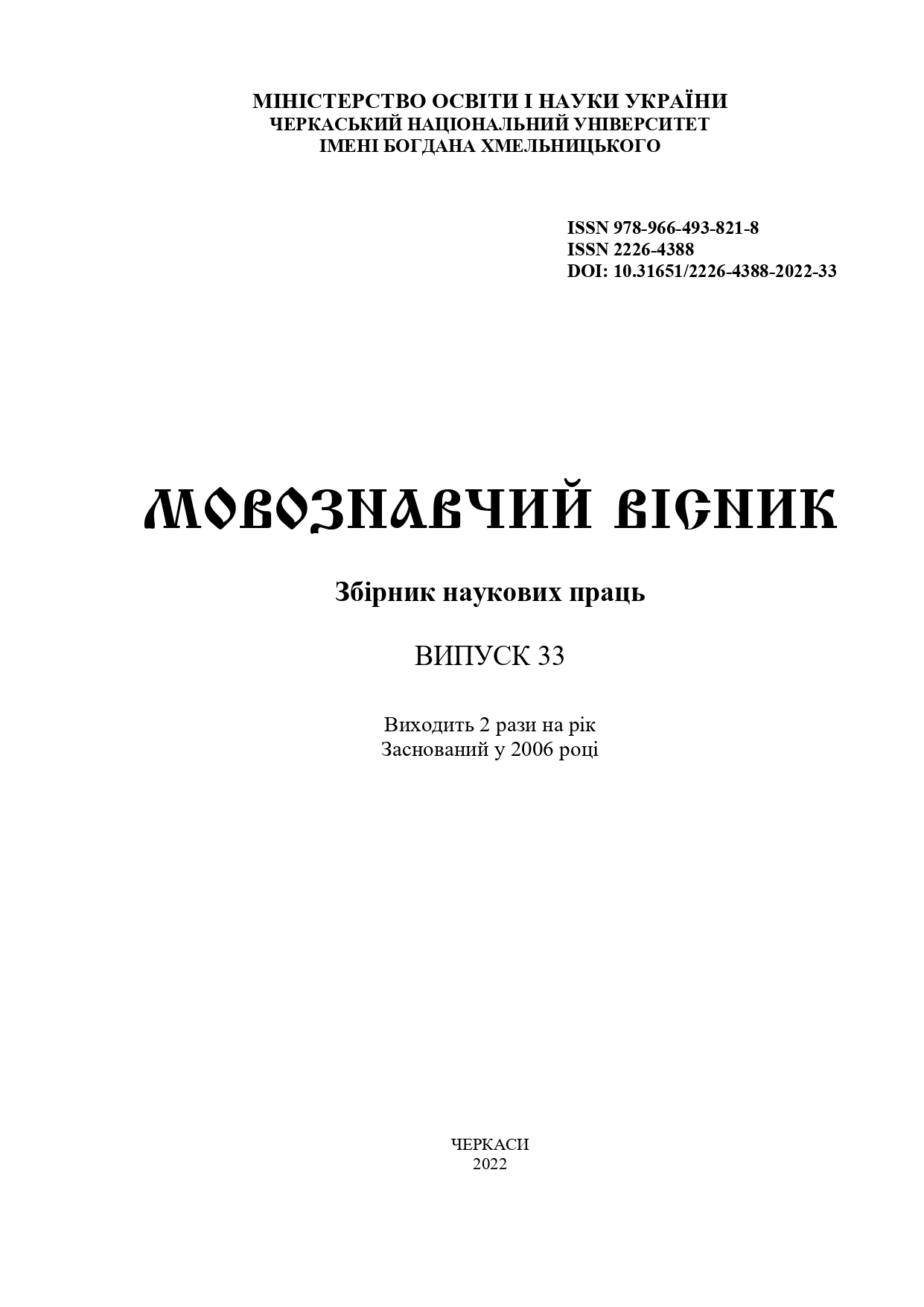SEMANTIC AND CONNOTATIVE POTENTIAL OF APELLATIVE LEXICAL AND DERIVATIONAL INNOVATIONS IN THE COMPREHENSIVE PUBLICISTIC AND POLITICAL DISCOURSE
Main Article Content
Abstract
Introduction. The fixation and all-embracing analysis of general lingual and occasional formations, represented in any style, reveal to be an important task of up-to-day linguistics.
Within the language system, the most dynamic lexical-semantic subsystem is represented primarily by lexical-derivational innovations, which are most consistently recorded by publicistic-political discourse.
This problem requires thorough study; largely it proves the relevance of the proposed scientific research.
Purpose. The systematic semantic-connotative, derivational, and syntagmatic analysis of the functionally most active appellative lexical and derivational innovations and the derived units that appeared on their basis, used in the publicistic-political discourse of 2021, tend to be the purpose of the article.
Method. General scientific methods of analysis and synthesis were used, among the linguistic methods the descriptive as well as methods of distributive and component analysis have been logically applied.
Results. On the basis of a large volume of actual material, the composition of the most functionally active innovative lexemes [oligarchization / de-oligarhization, ministerial fall, under-minister, impeachment, “mole” (“moles”) (“an agent recruited by the enemy”), theft, foraging, looting, applause,
shooting, “Wagnergate”]. The reasons for this lexeme resource appearance are motivated due to the action of extralingual factors that eloquently reflect resonant social events (evolution of the legislative framework, unmotivated personnel changes in the government and the Verkhovna Rada, pro-Russian ties of the certain politicians and high-ranking officials, declared presidential initiatives and their not always practical implementations, etc.). It was proved that during the analyzed period likewise in previous years
the process of creating new lexemes according to traditional and occasional models did not lose its
relevance and did not reduce the degree of productivity.
Originality. The ways of innovative lexemes create as well as their semantic and connotative structure, their ability to form semantic-syntactic connections with other components and to be the component of newly built syntactic, syntactically semi-free, lexical constructions, and periphrastic phrases with their inherent melioration or, which is more often, pejorativeness, were thoroughly examined.
Conclusions. The lexical-semantic system of the Ukrainian language was fruitfully supplemented by numerous lexical-derivational innovations, among which the appellative formations make a productive type.
These innovations are characterized by semantic and derivational multifunctionality, expressive connotative
(primarily pejorative) specification, derivational and syntactically constitutive perspective (they serve as a motivational basis for derivative formations, building material for syntactic constructions of various formalgrammatical structures, first and foremost the lexical and syntactically free collocations).
Article Details
References
Karpilovska, Ye. (2008). Problemy kompiuternoho modeliuvannia movnoi dynamiky [The issues of
computer modelling of lingual dynamics]. Available at: hhttp://litmisto.org.ua/?p=8147 (in Ukr.).
Koloiz, Zh. (2015). Neuzualne slovotvorennia [Non-usual derivation]. Kryvyi Rih, 156 (in Ukr.).
Kovalyk, I. I., Rodnina, L. O., Hryshchenko, A. P., Yurchuk, L. A., Hnatiuk, H. M., Rusanivskyi,
V. M., Horodenska, K. H., & Klymenko, N. F. (1979). Slovotvir suchasnoi ukrainskoi literaturnoi movy [The
derivation of the modern literary Ukrainian]. Kyiv: Nauk. dumka (in Ukr.).
Neliuba, A., & Redko, Ye. (2015). Leksyko-slovotvirni innovatsii (2014) [The lexical and derivational
innovations (2014)]. Kharkiv: Kharkiv. istoryko-filolohichne tovarystvo, 124 (in Ukr.).
Omelchenko, H. (26 November, 2020). Ze! «kroty» na Bankovii? [Ze! «moles» on Bankova?]. In:
Arhument [The reason]. Available at: https://argumentua.com/stati/ze-kroti-moskvi-na-bankov-i 2020 (in Ukr.).
Pena, L. (2016). Leksyko-slovotvirni innovatsii v suchasnii ukrainskii periodytsi [Lexical and
derivational innovations in the modern Ukrainian periodicals]. In: Scientific Herald of International Humanitarian
University. Series “Philology”/ 20(1), 135–138. Available at:
http://nbuv.gov.ua/UJRN/Nvmgu_filol_2016_20%281%29__39 (in Ukr.).
Persha antyoliharkhichna [The first anti-oligarchic] (12 December, 2021). In: Ukrainska pravda [The
Ukrainian truth]. Available at: https://www.pravda.com.ua/cdn/cd1/persha_antyoliharkhichna/ (in Ukr.).
Poslannia Zelenskoho do parlamentu: yak reahuiut u fraktsiiakh [Zelensky’s message to the parliament:
how the factions react] (1 December, 2021). In: ZN,UA. Available at: https://zn.ua/ukr/POLITICS/poslannjazelenskoho-do-parlamentu-jak-reahujut-u-fraktsijakh.html (in Ukr.).
Prytula planuie zareiestruvaty novu partiiu v 2022 rotsi – vona ne bude imennoiu [Prytula plans to
register a new party in 2022 – it will not be a registered party] (9 January, 2022). In: Radio Svoboda. Available at:
https://www.radiosvoboda.org/a/news-prytula-nova-partiia-2022/31646233.html (in Ukr.).
Stepanenko, M. (2021). Nainovitnishi dynamichni protsesy v ukrainskomu politychnomu leksykoni:
rik [The latest dynamic processes in the Ukrainian political lexicon: year 2020]. Poltava: Astraia, 250 (in Ukr.).
Taranenko, O. O. (2015). Aktualizovani modeli v systemi slovotvorennia suchasnoi ukrainskoi movy
(kinets XIX–XXI st.) [Updated models in the derivation system of the modern Ukrainian language (end of the 19th –
st cc.)]. Kyiv: Vydav. Dim Dmytra Buraho, 248 (in Ukr.).
Zelenskyi: V oliharkhiv teper dva shliakhy – staty chesnym biznesom abo rozpochaty «chornu»
storinku svoiei istorii [Zelenskyi: Oligarchs now have two ways – to become an honest business or start a “black”
page of their history] (5 November, 2021). In: INTERFAX-Ukraine. Available at:
https://ua.interfax.com.ua/news/general/777891.html (in Ukr.).
ZeOliharkhizatsiia [ZeOligarchization] (2021). Vikipediia [Wikipedia]. Available at:
https://uk.wikipedia.org/wiki/ЗеОлігархізація (in Ukr.).
Zhyrenko, Kh. (9 September, 2021). Kolomoiskyi, Verevskyi i «Sluha Narodu» stvoryly koalitsiiu
zarady zakonu pro oliharkhiv, – nardep [Kolomoiskyi, Verevskyi and “Servant of the People” created a coalition for
the sake of the law on oligarchs, People’s Deputy]. In: HLAVKOM [Hlavkom]. Available at:

